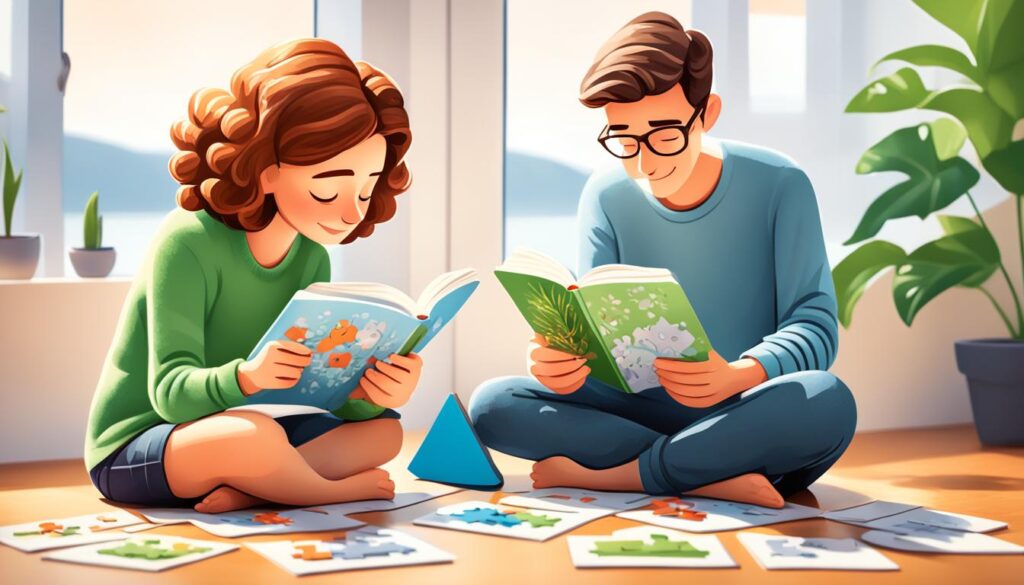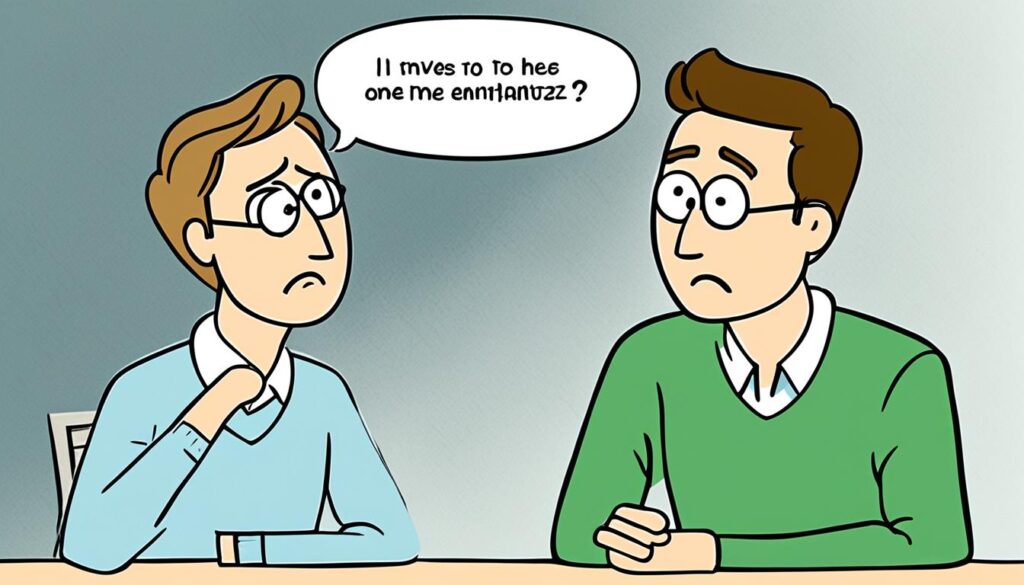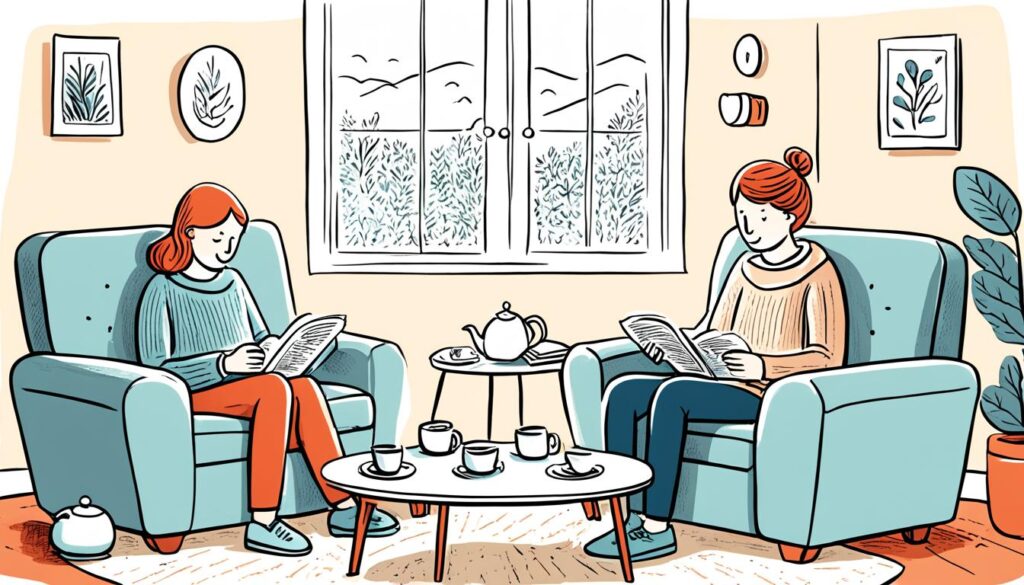As introverts, we often hear that “opposites attract”. But have you ever considered the potential for a dynamic friendship between two introverts? Think about it – you both value personal space, enjoy low-key activities, and deep, meaningful conversations over superficial small talk. Sounds harmonious, right?
But hold on, does this equation always work perfectly? Or does it come with its own set of complexities?
Unveiling the layers of introvert friendship, we’re going to explore how the world of “introversion” shapes their bonding, how they find solace in each other’s company and what challenges they might face in their journey of maintaining a fulfilling friendship.
Leveraging findings from psychological studies, personal anecdotes, and behavioral patterns witnessed across various social platforms, the objective remains not just to answer the question “Can Two Introverts Be Friends?” but to identify the unique contours that define and influence introvert socialization. Stay with us as we dive into this compelling narrative of friendship between introverts.
Key Takeaways
- Introverts often find a significant level of understanding and compatibility with fellow introverts due to shared interests, behavior patterns and need for personal space.
- Introverted friendships may benefit from mutual respect for personal space and understanding of each other’s sometimes fluctuating social batteries.
- Introverted friends often enjoy low-key activities together, highlighting their potential to create a gratifying companionship.
- Challenges exist in introverted friendships – both parties might be too shy to initiate plans, their social needs might mismatch, or they could struggle with open expression of feelings.
- Understanding the intricacies of introvert friendships can help in developing healthier, deeper bonds and empathetic relationships.
1. They understand each other’s need for alone time.
As introverts, they cherish personal space and own company which becomes the nucleus of their friendship. The essence of this unique bond lies in the shared respect for one another’s comfort zone and the need for alone time. Unlike extroverted friends who might misconstrue their introverted friend’s need for solitude, an introvert friend inherently understands and values this quietude.
One introvert might articulate, “I savor my hours of solitude to recharge. It’s a blessing to have an introvert friend who doesn’t take my need for alone time personally. Our shared respect for solitude is truly liberating.”
More often than not, friendships between introverts manifest healthier boundaries. Being in the same shoes allows them to recognize and respect the other’s need for space, thereby deepening their comradeship.
| Characteristic Traits | Introverts |
|---|---|
| Need for Alone Time | High |
| Value for Personal Space | High |
| Comfort in Own Company | High |
| Understanding of Introvert Friend’s Needs | High |
To sum up:
- Introvert friends mutually value and respect each other’s need for alone time.
- This shared understanding fosters a stronger bond and healthier boundaries in their friendship.
- The respect for personal space deepens their connection, as each one knows when to step back and allow the other some solitude.
2. Social interactions won’t be overwhelming since they both prefer fewer social commitments.
To start, let’s delve into the distinct extroversion and introversion behaviors. Unlike individuals drawn towards extroversion, introverts often experience a depletion of their ‘social battery’ in environments with extensive demands for interaction. This can be particularly overwhelming for them.
In contrast, as an introvert, you might have noticed a certain comfort that arises when hanging out with fellow introverts who appreciate the few social commitments you are comfortable with. You likely prefer settings with fewer people and less pressure to engage, creating a comfort zone that respects and preserves your social battery. A survey conducted by the American Psychological Association corroborates this behavior, substantiating the preference of introverts for environments with fewer social commitments.
“When introverts socialize with other introverts, they don’t feel the same pressure to fit into societal expectations that can often drain their social battery,” says psychologist Dr. Susan Cain, a prominent advocate for introverts.
This understanding of each other’s needs creates a conducive atmosphere for introverts to thrive in. Insights from social behavior research inform us that introverts tend to do well in one-on-one interactions or small groups, even if it’s just the two introverts hanging out.
- Introverted friendships settle into a rhythm of fewer social outings, thus reducing the toll on each other’s social battery.
- Such friendships understand and respect the need to retreat into one’s comfort zone to recharge periodically.
- Importantly, the shared tendencies of introverts carve an empathetic space that helps maintain a balance between social interaction and individual solitude.
Hence, if you are an introvert finding solace within their own realms, bonding with another introvert could be the key to a fulfilling and less overwhelming social life.
3. They can enjoy low-key activities together like reading, watching movies, or relaxing at home.
Introverts are naturally drawn to moments of quietude and solitude, which often translates into their recreational activities. The commonplace hobbies famously adored by introverts are typically low-key, perhaps cozying up with a riveting book or unwinding in front of a captivating TV show.
Thus, it’s not surprising that many introvert friendships flourish around shared preferences for such activities. These friendships are often devoid of the common societal pressure to maintain constant chatter or participate in high-energy recreational behavior.
Individuals can derive joy from simply sharing a space and enjoying the company of a friend, while participating in parallel activities, may that be reading separate books or indulging in different hobbies. This understated companionship, centered around low-key activities, is an appealing facet of introvert friendships.
Incidentally, the rise of stay-at-home hobbies has been notable, likely spurred by global circumstances that necessitated homebound lifestyles. This has augmented the appeal of homely hobbies and relaxing at home, not just among introverts, but across different personality types. However, this trend is particularly relevant for introverts, as it aligns seamlessly with their inherent preferences.
| Popular Low-Key Activities | ||||
|---|---|---|---|---|
| Reading | Watching Movies | Painting | Journaling | Meditation |
Let’s dive deeper below:
- Reading: the immersive and solitude-nature of reading chimes well with introverts, often leading them to develop an avid love for books. In the context of introvert friendships, this shared interest often becomes a cornerstone, letting them discuss literature and even recommend books to each other.
- Watching Movies: Highly engrossing, they pose an excellent medium for introverts to enjoy some low-energy time. Possessing a shared fascination for specific genres or series can be a bonding point in introverted friendships.
- Painting: The tranquil and introspective nature of painting overlaps ideally with introverted characteristics. Thus, painting or other quiet creative hobbies can often weave a bond within introverted friendships.”
- Journaling: Not all forms of self-expression involve speaking. Journaling or individual creative pursuits enable introverts to express themselves in their comfort zone. Similar interests can foster a strong understanding between introverted friends.
- Meditation: Introverts often seek calm, and meditation practices resonate well with their pursuit. A shared interest in such practices can invite an additional layer of depth into introvert friendships.
Remember, each friendship is unique, and what holds true for one may not apply to another. The essence lies in the bonds and shared interests that bring us together.
4. Small talk won’t be expected – they can dive right into deeper conversations.
Introverts, known for their inclination towards a rich, contemplative inner world, often bypass the expected pleasantries and dive straight into thought-provoking, deeper conversations. Small talk, a social currency for many, is not a prerequisite for connection between two introverts. This exemption from the usually necessary small talk is a relief, welcomed by many introverts as they form deep connections with similar-minded individuals.

Consider a pair of introverted friends, who instead of engaging in small talk about the weather or recent movies, commence their conversation with a discussion about the implications of artificial intelligence on job security, or an in-depth exploration of a philosophical concept. Their shared preference for substantive discourse is not only mutually preferred but has been found to increase the potential richness of their friendship.
“Small talk can often feel shallow and incomplete. As introverts, we thrive on deep, meaningful conversations where we can express our thoughtfulness and explore unseen facets of our inner world. Introverted friendships offer this depth and exploration routinely, which is incredibly refreshing.”
Below is an illustrative comparison between introvert-introvert conversations and those typically found in other friendship dynamics, demonstrating the notable difference in depth and substance:
| Conversation Type | Small Talk? | Depth of Discussion | Mutual Interest? |
|---|---|---|---|
| Introvert-Introvert Connection | Minimal | High | Yes |
| Typical Friendship Dynamic | Often Expected | Variable | Can vary |
As you continue navigating your social world as an introvert, remember that the lack of small talk in your interactions with fellow introverts is not an obstacle. Rather, it serves as a gateway to deeper conversations, allowing you both to explore your thoughtfulness and complex inner worlds unfettered.
5. Neither will feel pressured to constantly be “on” or entertaining the other.
Bonding with introverted friends presents the unique advantage of a comfort zone that neither requires you to constantly be “on” nor the center of the entertainment spotlight. While interacting with others, introverts often face social pressure to perform, or keep the interaction lively and engaging. This can be a stressful and exhausting endeavor. However, this pressure significantly diminishes in the presence of another introvert. Both friends sharing an introverted disposition leads to a more comfortable, natural, and authentic interaction. Here’s an example:
“My best friend, like me, is an introvert. And one of the things I appreciate most about our friendship is that we can just ‘be’ with each other. There’s no pressure to fill the silence, be constantly entertaining, or keep the conversation going. We’re perfectly content just enjoying each other’s company in peaceand quiet.”
Informing further, let’s consider the findings of an emotional wellbeing report:
| Insights | Implications |
|---|---|
| Introverts feel relief with a friend who doesn’t expect them to be the center of attention. | Introverts can comfortably be themselves without feeling obliged to conform to socially exhausting expectations. |
| Introverts enjoy each other’s company without demands. | Their friendship is less about doing and more about being, creating a sanctuary from external pressures. |
This image offers a glimpse into the relaxing nature of a friendship between introverts where they’re each comforted by the other’s comfortable silence and lack of expectations. To summarize:
- Introvert friends don’t pressure each other to constantly be “on”.
- They appreciate each other’s quietude and require minimal entertainment.
- They relish in the shared comfort zone that celebrates each other’s true selves.
In a world where being constantly entertaining, outgoing and in the spotlight can be overbearing, friendships between introverts provide the perfect haven to just be themselves, in the easiness of their shared silence and comfort.
6. Their quiet, reserved natures complement each other well with little conflict over attention or noise levels.
It is often said that quiet people have the loudest minds. In an introvert-introvert friendship, this holds immensely true. Their quiet, reserved natures often complement each other, creating a symphony of silence where understanding and companionship thrive.

The low noise level in their interactions forms the tranquil backdrop to their bond. Without the pressure to occupy the limelight or be the life of the party, introverted friends revel in the quiet corners of their shared spaces. Their preference for lower noise levels significantly decreases potential areas of conflict, thereby fortifying their connection.
| Attribute | Benefit |
|---|---|
| Quiet Nature | Promotes an atmosphere of calm and peace, enhancing each other’s comfort. |
| Reserved Disposition | Fosters a sense of deep respect for personal space and individual boundaries. |
| Low Noise Level Preference | Reduces potential conflicts and encourages meaningful dialogue in peaceful environments. |
Introverted friendships thrive in an atmosphere of mutual understanding. This understanding stems from their shared inclination towards quieter, more relaxed environments. Societal observations note that such friendships may benefit from a mutual respect for each other’s comfort zones, contributing to understanding each other’s need for solitude and creating a space where both can exist without feeling the need to fit into extroverted norms.
As observed by psychologist Laurie Helgoe, “Introverts feel content and energized when reading, thinking, exploring their thoughts and feelings, or diving into rich complex activities.” And it is these solitary, rich complex activities that form a significant cornerstone in friendships between introverts.
- There’s unparalleled understanding and acceptance in a friendship where ‘quiet’ isn’t synonymous with ‘awkward.’
- Conversations may be limited, but the depth and authenticity of communication often far exceed the norms of regular social interaction.
- The understanding of each other’s reserved nature allows for greater respect for personal freedom and individuality, further bolstering the friendship.
Introvert-introvert friendships are exceptional bonds crafted in silence and nurtured with mutual respect and understanding. While they may seem quiet on the outside, the depth and richness of their friendship often transcend conventional norms, reflecting a bond that stands strong in its unique tranquility.
7. They appreciate each other’s listening skills and ability to understand without lots of words.
Experiencing genuine friendship often demands effective communication. Though perceived as quieter or less conversational, introverts have developed their own unique means of connection. One distinguishing characteristic is their often exceptional listening skills. This is frequently coupled with a deep understanding that transcends the need for verbose discourse.
Introverted individuals flourish in environments primed for open-ended, meaningful conversations, swapping small talk for profound discussion. This dynamic sets the stage for relationships that hinge on attentive listening and nurture bonds with few words.
The art of communicating without employing too many words is a remarkable trait of introverted companionships. Introvert-introvert friendships, as they are more likely to be intuitive to the nuances embedded within their peers’ silence, uphold a high standard for emotionally intelligent connection.
“Introverts have a uniquely wonderful way of understanding each other. Their connections are often marked by an ability to decipher meaning from the sparsest array of words. This kind of empathetic listening not only strengthens their bonds but also reinforces mutual respect.”
Let’s delve deeper into the aforementioned elements of nurturing friendships for introverts:
- Listening Skills: The natural inclination of introverts to listen more than they speak contributes to a more empathetic understanding.
- Communication With Few Words: Word economy can be a virtue in introverted friendships, eliminating unnecessary filler talk and leading to more meaningful dialogues.
- Emotional Intelligence: This form of communication fosters emotional intelligence among introverts, forming solid bases for lasting, supportive friendships.
Introvert-introvert friendships showcase the subtlety and depth achievable in interpersonal connections when we learn to listen and understand with a few, carefully chosen words. It’s not about excessive verbosity, but about the emotional connection that results from understanding a friend’s silence as much as their words – a quality introverts often have in abundance.
Reasons Two Introverts May Not Have a Good Friendship:
Do you believe that being an introvert automatically guarantees successful friendships with other introverts? While often true, it’s not always flowers and sunshine when two introverts embark on a journey of friendship. Just like any other relationships, it comes with its unique set of challenges and potential disagreements. But what are the quirks that could hinder the flourishing of friendship between two introverted individuals? And how can these be navigated to create meaningful connections that can withstand the test of time? Are you curious to find out if introverts can truly maintain long-lasting friendships? Let’s explore.

Key Takeaways:
- Not all introvert-introvert friendships are smooth sailing; they can indeed have their own set of challenges.
- Shyness in initiating contact is a common hurdle in friendships between introverts.
- Mismatched social needs can lead to friction in introvert friendships.
- Differences in energy levels and moods may cause misunderstandings and disagreements.
- Introverts may find expressing feelings openly challenging, potentially hindering emotional intimacy.
1. Sometimes both may be too shy to initiate contact or plans, leading to less interaction.
If you’ve ever struggled to make the first move in initiating plans or maintaining a conversation, you’re not alone. Many introverts often find themselves in this position, a trait largely attributed to their natural inclination towards introspection and solitude. But when both friends are introverts, this shared shyness can lead to diminished interaction.
“Introverts, due to their tendency toward shyness, might not reach out to maintain friendships, which can result in diminished interaction if both parties are waiting for the other to make the first move” – Sociability research
In relationships between introverts, consistent, active communication is key in overcoming this barrier, and fostering a bond that thrives despite introverted inclinations.
Here is how shyness affects introvert friendships:
| Effects | Consequence | Solution |
|---|---|---|
| Limited contact | Introverts may connect less frequently due to their reluctance in making the first move. | Mutual agreement to initiate contact alternatively, and scheduling regular catch-ups. |
| Diminished interaction | Without frequent communication, the bond between introverts may weaken over time. | Actively maintaining communication channels, be it through messages, calls, or meet-ups. |
| Delayed plans | Introverted friends may frequently postpone plans due to hesitations in initiating. | Prior discussion and mutual agreement on plans, thus reducing the onus on one individual to initiate. |
- Communicate: Active, consistent communication can help mitigate the effects of shyness in friendships between introverts. It is essential to keep the discussions flowing to ensure the relationship doesn’t feel stagnant.
- Understand: Empathize with the other party’s shyness. Recognizing these shared introverted tendencies allows for greater understanding and acceptance of idiosyncrasies, enhancing the bond.
- Compromise: Take turns in making the first move. Establishing a system where both parties share the responsibility of initiating plans can make the process feel less daunting and more balanced.
2. If one introvert needs more social interaction than the other, it could cause issues.
The world of the introvert is often misread as antisocial or aloof, but this couldn’t be further from the truth. Being an introvert doesn’t mean shunning social interaction. It is about choosing the right kind and amount of social interaction that resonates with one’s unique persona, and where these needs mismatch with a fellow introvert, complications might arise.
Introverts might lean on like-minded friends to navigate through the overwhelming sceneries of extroverted world. They enjoy solace, solitude, and an occasional deep conversation, and these shared values lay the foundation for profound connections. 
However, when it comes to the amount and type of social interaction, it is no one-size-fits-all even among introverts. As some might crave for a weekend full of books or Netflix, others might long for a walk in the park with friends or a comforting coffee chat. There exists a diverse spectrum within introversion itself, and the individual needs could range from desiring minimal interaction to moderately substantial socialization.
“Introversion isn’t about being mute; it’s about understanding what level of social interaction makes one feel most alive yet peaceful and respecting that in others too.” – Susan Cain, best-selling author of ‘Quiet: The Power of Introverts in a World That Can’t Stop Talking’
Case studies of introvert relationships sometimes illustrate conflicts arising from one party desiring more social engagement than the other. When one introvert is content with a quiet evening at home while the other is in the mood for an impromptu coffee house visit, it might lead to unmet expectations and strained friendships. Following are some scenarios arising from mismatched social needs among introverts:
- One introvert wants to hang out at popular social events while the other prefers a quiet house party.
- One introvert seeks deeper connections by often spending time together, while the other is content with significant yet less frequent interactions.
- While one introvert might enjoy an occasional networking event, the other might find it draining.
These instances underline potential incompatibilities even among similarly introverted personalities. Thus, like all friendships, it is essential for introverted friendships too, to have open discussions around individual social preferences, thereby nurturing a connection that respects and acknowledges the unique introversion spectrum of each.
3. Differences in energy levels or moods on a given day could cause mismatches.
Although introvert companionship and introvert friendship can cover a long way in terms of understanding and compatibility, there are instances where differences in energy levels or moods on a given day could potentially cause mismatches.
Let’s dive deeper into the why’s and how’s of this predicament, and then explore strategies to navigate it, ensuring a more harmonious relationship.
Wellness studies have documented that fluctuations in energy and moods are natural, particularly among introverts who may already have lower energy reserves for socialization. This often leads to postponements or misunderstandings amongst introverted friends. Imagine a scenario where you’re mentally exhausted after a long day of intellectual work, and your introverted friend suggests taking a short hike or going on a spontaneous city exploration. Their uninhibited energy could feel overwhelming, which might strain your friendship.
As an introvert, your emotional energy can be likened to a battery. It may drain faster in highly social situations and need time to recharge. Understanding this unique dynamic is key to sustaining harmonious relationships with your fellow introverts.
If we look at personal accounts, introverts often recount days when one’s mood doesn’t align with the other’s. Perhaps you’re feeling low and need solace in your introspective world, while your friend might be in a decidedly upbeat mood. This mismatch can create a temporary rift in your friendship.
But fear not, evidence suggests that having an open dialogue about your energy levels and current mood goes a long way in managing such situations. Here are a few strategies:
- Open up about your energy levels and mood swings: Create an environment where both of you can freely express your current state of mind without apprehension.
- Encourage mutual understanding: It goes a long way in accepting fluctuations in mood and energy.
- Facilitate adaptability: Be flexible with plans, accommodating for energy levels and moods.
In conclusion, understanding and accepting differences in energy levels and moods are key to maintaining a strong and introspective friendship amongst introverts.
4. Expressing feelings openly may be challenging for both, hindering emotional intimacy.
When it comes to nurturing friendships for introverts, fostering a sense of emotional intimacy can often be more challenging than you might think. Typically, introverts are known for their penchant for personal space, which can sometimes extend into their emotional territories as well. This tendency can inadvertently create barriers to expressing feelings openly in a friendship, especially when both friends are introverts. As a result, the emotional intimacy that is so crucial to deep, meaningful relationships can be hindered.
For instance, consider a scenario where you, an introverted individual who values personal space, feel stressed about an upcoming work project. Instead of sharing your anxieties with your introvert friend, you might find yourself holding back, trying to resolve your internal turmoil on your own. This lack of emotional sharing might be due to a fear of over-burdening your friend, or perhaps a reluctance to step out of your comfort zone.
On the other hand, your friend, being an introvert themselves, might sense something is amiss but won’t pressure you into revealing your thoughts. They may also be struggling with their own issues and navigating a similar internal debate about voicing their concerns. This mutual hesitancy can make it hard for either of you to initiate such a conversation, potentially leading to a superficial relationship despite the shared bond.
However, can introverts maintain long-lasting friendships? Absolutely, as long as they take the time to understand one another’s nuances and make a conscious effort to overcome potential communication barriers. It’s perfectly fine to be a good listener and respect the need for personal space, but there are also times when expressing feelings is of the utmost importance. By acknowledging this hurdle, you and your friend can work together to promote openness and achieving the emotional intimacy that nurtures long-lasting, fulfilling introvert friendships.
FAQ
Can Two Introverts Be Friends?
Yes, two introverts can make great friends. They often have a natural understanding of each other’s needs for solitude and reflection, helping them to build a strong bond. They enjoy low-key activities and deep conversations, connect over shared interests, and appreciate each other’s quiet nature. However, it’s essential that both parties make an effort to initiate contact and maintain communication, as introverts can sometimes be hesitant to reach out first.
Do introverts need alone time in friendships?
Yes, introverts tend to value alone time and personal space. They appreciate friends who understand and respect these needs, which can lead to stronger, healthier bonds. Being with someone who doesn’t take these needs personally can be immensely beneficial for an introverted individual’s overall sense of well-being.
Can two introverts enjoy social interactions together?
Yes, two introverts can enjoy social interactions together, especially because they typically prefer fewer social commitments. They’re likely to find comfort in one-on-one interactions or small social gatherings rather than large, bustling environments. Being with someone who shares similar social energy levels can also make the friendship less overwhelming.
What activities might two introverted friends enjoy together?
Introverted friends often enjoy low-key activities together, such as reading, watching movies, or just relaxing at home. They’re likely to appreciate quiet spaces and solitary pursuits, making these activities a good match for their shared interests.
What kind of conversations do introverted friends typically have?
Introverted friends often lean towards deeper, more meaningful conversations. They tend to shy away from small talk and are more likely to dive into substantial, thought-provoking discussions around shared interests, ideas, or experiences.
How do introverted friends handle social pressures?
Two introverted friends often find comfort and relief in their shared understanding of social pressures. They’re unlikely to pressure each other to constantly be “on” or to entertain, allowing each other to simply be themselves without judgement or expectation.
Can two introverts understand each other’s quirks?
Yes, two introverts can understand and appreciate each other’s quirks. Their quiet, reserved natures often complement each other well, with minimal conflicts around attention or noise levels. They’re likely to empathize with each other’s need to recharge quietly after social engagements, leading to mutual understanding and respect.
How do introverts communicate in a friendship?
Introverts often possess strong listening skills, valuing understanding and thoughtfulness in conversation. They appreciate others who can listen attentively and understand with few words, making them good listeners in a friendship with fellow introverts.
Are there challenges in friendship between two introverts?
Yes, like any type of relationship, there can be challenges in an introvert-introvert friendship. They can sometimes be too shy or hesitant to initiate contact or plans, which can lead to less interaction. If their needs for social interaction or their energy levels and moods differ greatly, it can cause friction or misunderstandings. Also, expressing feelings openly can be challenging for both, which might hinder emotional intimacy if not addressed.
Can introvert-introvert friendships work long-term?
Yes, introvert-introvert friendships can work long-term if both parties are dedicated to maintaining the relationship. They might need to negotiate differences in social needs, energy levels, and expressing feelings openly. Effective communication, understanding, and respect for personal space and each other’s introverted nature are key elements in nurturing such friendships over time.





